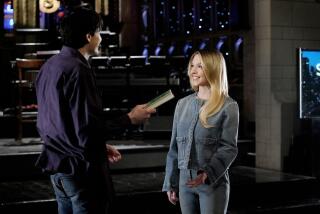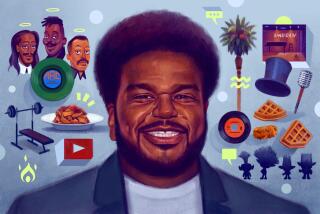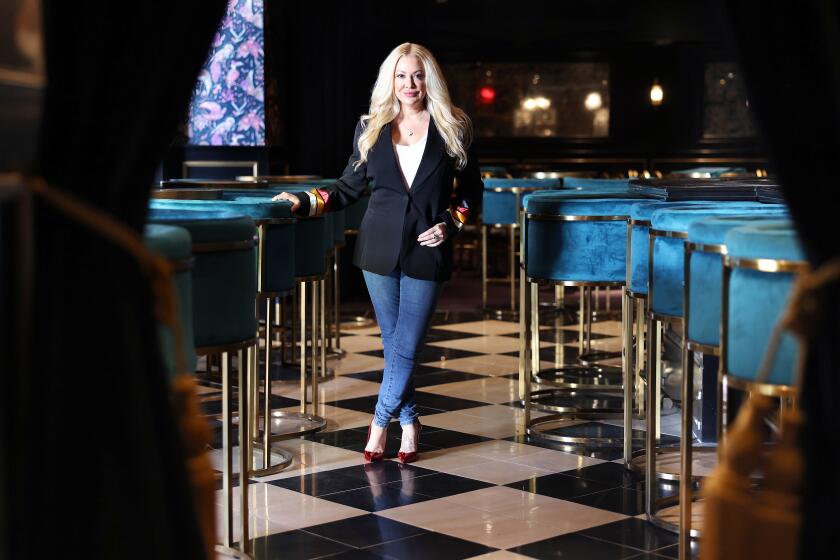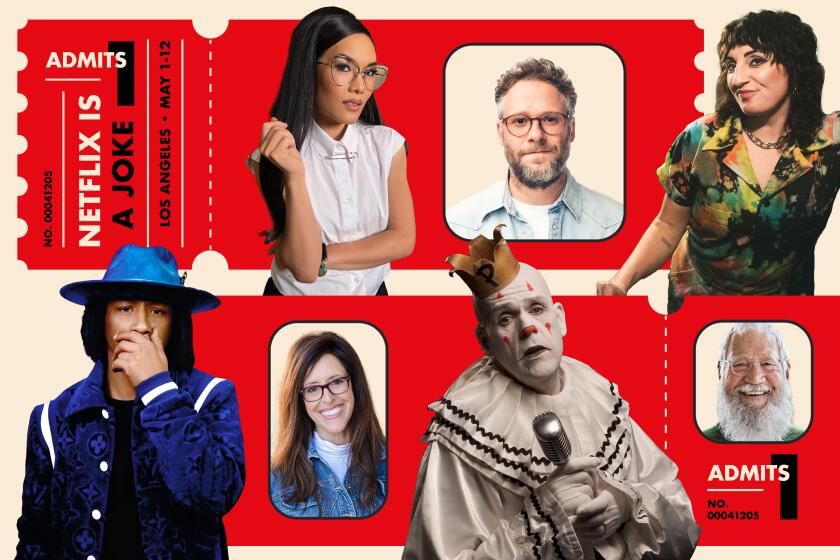‘Portlandia’: Straight outta Portland
Fred Armisen, who is on “Saturday Night Live,” and Carrie Brownstein, who was in the band Sleater-Kinney and now leads the band Wild Flag, are the creators and stars of “Portlandia,” a strange and beautiful sketch show filmed in Portland, Ore., where Brownstein lives. Its second, longer season begins Friday on IFC, even as the stars have taken their show on the road. (The Los Angeles stop, Jan. 17 at the Echoplex, is sold out.) Like the city in which it’s set, the series’ tone is both clouded and lovely. There is a sense of celebration that informs even its most cutting pieces, as the pair portray a range of hipsters, hippies and solid citizens grappling — sometimes aggressively, often passive-aggressively — with life in a city that has been often described as one of the nation’s most livable, and knows it. But it does rain there a lot.
How much does the weather in Portland affect the spirit of the city, and the sort of things you explore and satirize?
Carrie Brownstein: One interesting thing about the Pacific Northwest — it’s definitely specific to Portland — is that there’s a real coalescence between internal and exterior landscape. People’s moods and creative spirit are really affected by the weather. A lot of the music that comes from the Northwest has this underlying ruggedness to it, or bleakness. I don’t think our show is bleak, but I do think that the weather informs the look of the show and the earnestness of the show — because you’re striving for this optimism you have to have inside you when outside it’s not sunny all the time. Plus, Fred and I just love to layer our clothing.
Fred Armisen: Which actually helps, because wardrobe and costumes can really define a character. There’s more opportunity, because it’s a little chillier, to have that one jacket that says more, as opposed to just a T-shirt, you know, if we had to shoot, like, in Miami.
Many of your characters have a common desire to do things right, ethically, that often goes very wrong. Do you see those impulses in yourself?
CB: I definitely struggle with that. I want to be well-meaning. But I’m often, like our characters, flummoxed by this set of esoteric rules that it’s not just enough to be good, you have to be good in a specific way. And I think sometimes that turns me into a contrarian, where I have to do the exact opposite of what I’m supposed to do. Like, if I’m at a coffee shop and they have eight different recycling bins, I just want to put everything in the trash, ‘cause I just can’t stand there for 20 minutes to figure it out. I think those internal battles exist all the time. On top of that there’s the awareness of, “Is this really what is worth fighting for and thinking about? Is this actually of value, or a good way of being in the world?” I think a lot of our characters grapple with that existential crisis.
Has the show changed your relationship at all?
FA: In a good way.
CB: We’re definitely closer. We’ve spent an exorbitant amount of time together and never seem to get sick of it. People thought it was actually weird, I think, during the summer because we would shoot for 12 hours a day and we would be together all day, and then we would sometimes get dinner and then we would go to our respective homes but we would continue to text.
FA: And also, we both like working, so it’s optimum.
Is this a show you couldn’t have done when you were younger?
CB: I think that there is an anxiety inherent in the show I would not have had 10 years ago. Fred and I talk a lot about just that moment where you realize you’re kind of a perennial adolescent, but at some point you have to enact adulthood. And sometimes those moments are jarring, and crushing, because it’s just an acknowledgment that you have let things go, that things have passed you by. So I don’t think we could have made this show in our early 20s.
FA: And I think that because Carrie and I don’t have any kids, our radar for that is a little sharper. For example, I went to this street fair in Portland —it inspired some of our sketches — and I noticed a lot of dads, with really white and gray hair, but with tattoos that were kind of Lollapalooza-y and tribal; clearly they were in bands. I don’t have a kid to go, like, “Oh well, that’s just another dad.” All I can do is go, “Wow, look at that guy, I wonder when that tattoo’s from, look how faded it is.” And it’s not a judgment call, it’s just a new thing of note. Those tattoos were such a youthful thing to me — you couldn’t be any more alternative than that. But when you look at the faces of these guys, they look like principals I had in school — really fully, fully older guys. It’s not a bad thing, it’s just jarring, like Carrie said. It’s something that really moves you, like, “Wow, this is happening fast.”
More to Read
The biggest entertainment stories
Get our big stories about Hollywood, film, television, music, arts, culture and more right in your inbox as soon as they publish.
You may occasionally receive promotional content from the Los Angeles Times.







